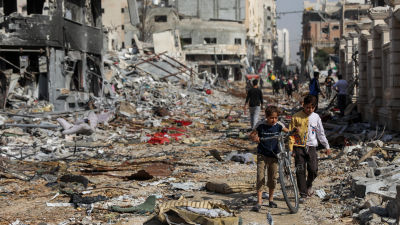Aid agencies issue desperate appeal for access into 'apocalyptic' Gaza

By Roohi Hasan, Senior Producer
The international community has been urged to act now on the "apocalyptic" humanitarian crisis in Gaza by some of the world's largest aid agencies and human rights organisations.
Non-governmental organisations (NGOs), including Oxfam, Save the Children, and Amnesty International, held a joint press briefing on Thursday - which marked two months since the war between Israel and proscribed terror group Hamas began.
The groups appealed for an immediate and sustained ceasefire in the Middle East conflict, saying it would not be possible, otherwise, for them to help save lives.
Spokespeople for the NGOs described the scale of the humanitarian crisis in Gaza as "devastating" and "catastrophic", warning of worse still to come if famine and disease are not addressed.
The Hamas-run Gaza Health Ministry says more than 17,000 people have died in the Gaza Strip, since the fighting started, with more than two thirds of them women and children.
At least 1,200 people died when Hamas and other Palestinian militant groups attacked southern Israel on October 7.
Jason Lee, Country Director for Save the Children in the occupied Palestinian territories, said a child is killed in Gaza around every ten minutes.
He added that 4,500 children are thought to be missing buried under rubble or presumed dead.
The briefing heard stories of "overwhelmed" aid and hospital workers, forced to treat patients in "impossible conditions" without pain relief and dwindling supplies of medicine.
Head of humanitarian policy at Save the Children, Alexandra Ye said: "We are literally running out of words to describe the horrors that have unfolded in Gaza.
"We've heard our colleagues and Jason has told us of hundreds of children lining up for a single toilet in the south, children and families roaming the streets of what hasn't been flattened with no food, nowhere to go and nothing to survive on.
"Those who survive the bombardment now face eminent risk of dying, of starvation and disease. Our teams are telling us of maggots being picked from wounds and children undergoing amputations."
She added: "A World Food Programme report that came out on food insecurity shows that nine out of 10 people reported spending at least one full day and night without food.
"And 18% said they spent more than 10 days in the last month without food. Our staff have told us that this is significantly worse for children."
Want a quick and expert briefing on the biggest news stories? Listen to our latest podcasts to find out What You Need To Know...
Warnings were also issued about the risk of misinformation, with calls for international observers to be allowed into Gaza so that the war can be independently reported.
And repeated calls were made for international mediators to help secure an immediate ceasefire to the war.
Paul O'Brien, Executive Director for Amnesty International USA, told reporters those with influence over Israel - such as the United States - should exert it and stop arming the Israeli Defence Forces (IDF).
He added that calls for a temporary pause to the fighting should not get in the way of negotiations for a sustained ceasefire.
Speaking to ITV News, Mr Lee called the war "asymmetric", adding it was leading to the "systematic killing" of the more than two million people living in the Gaza Strip.
He said the conflict was being underpinned by an "absolute disregard and adherence to international humanitarian law", and called for "accountability" on all sides to "meet the obligations on the international law".
"My message is that there has to be a definitive ceasefire," he said.
"This is the only way to protect civilians. It is also the only way to allow humanitarians to deliver the assistance that we have to.
"We cannot deliver when there's [an] active conflict going, we cannot deliver because there's not been enough supplies coming in."
Jason Lee, Country Director for Save the Children in the occupied Palestinian territories, told ITV News: 'This asymmetric war is targeting the most vulnerable.'
He added: "The scale and the scope of this is unprecedented. And I know we use that word a lot, but in this case it is.
"And we are at risk of the entire systematic killing of the 2.3 million people in Gaza - half of them being children - so there are 1.1 million children in Gaza.
"And also the complete destruction of all civilian infrastructure within the Gaza Strip.
"And this is the consequences if we do not take action as the international community."